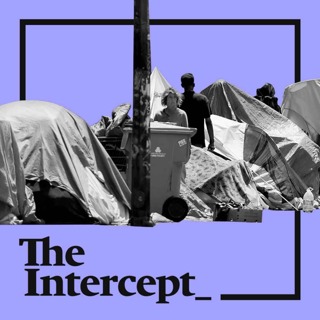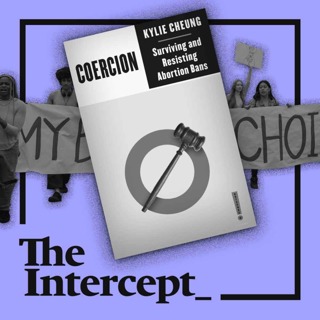
Trump’s Cult of Power Cancels Free Speech
In the wake of Charlie Kirk's death, conservatives have moved quickly to consolidate power and attack their political enemies, whose relative impotence and penchant for capitulation to power and decorum have been on full display this week."You have these right-wing forces that smell blood, they smell weakness, and they're going after everyone who doesn't comply and run through the obligatory kind of mourning," said Adam H. Johnson, a media analyst and co-host of the “Citations Needed” podcast. This week on The Intercept Briefing, host Jessica Washington speaks with Johnson about the White House's weaponization of Kirk's death and the broader rightward tilt of the media ecosystem."I think what they're doing in part [is] to make it very, very difficult for Democrats to ever beat Republicans. If you gut their media, if you gut their nonprofits, if you snuff out any kind of dissent, if you punish people at the workplace and dox them,” says Johnson. “They're basically trying to make 9/10 the new 9/11. Obviously the scope is different, but in terms of the sort of emotion, the shock. Obviously it was on video, which adds to this extra layer of psychology that's being exploited. They want to exploit that to jam in policies which they've long wanted to jam in.”Johnson also noted that part of what we're witnessing with the increasing alignment between corporate media and Trump is the end of the "veneer" of liberalism among the billionaire class."You have this increasingly postmodern lack of a need for this liberal patina, this kind of veneer of universalism, and everything is just about the exercise of raw power, the exercise of pure racist propaganda," he said. "So yeah, things are bad. But I think what we've learned is that they can get worse." Listen to the full conversation of The Intercept Briefing on Apple Podcasts, Spotify, or wherever you listen. You can support our work at theintercept.com/join. Your donation, no matter the amount, makes a real difference. Hosted on Acast. See acast.com/privacy for more information.
19 Sep 40min

The Real Charlie Kirk
After the fatal shooting of right-wing personality Charlie Kirk on Wednesday afternoon, the rhetoric on the right quickly escalated. Influential voices on social media declared war on the left, despite the absence of any knowledge about the suspect or their motive at the time. President Donald Trump made a formal address where he pledged to go after the “radical left.” “We are seeing language weaponized so swiftly,” says Intercept columnist Natasha Lennard. “I think the Trump administration has a clear track record at this point of taking these little chips that they can leverage to induce state repression and encroach on civil liberties,” says Ali Breland, a staff writer at The Atlantic.This week on The Intercept Briefing, host Akela Lacy speaks to Lennard and Breland about the implications of Kirk’s killing and how we think about political violence in the U.S. “We already know that whoever it does turn out to be, we are living in a moment with an authoritarian government that will weaponize this moment either way,” says Lennard. “This is about finding any opportunity to further escalate the white nationalist project.”“I worry that his assassination is a progression toward something darker in which a wider group of people are considered to be targets for political violence,” says Breland. “And I don't think that the rhetoric that's coming out right now is doing anything to stop it or off-ramp us on this dark path.”Listen to the full conversation of The Intercept Briefing on Apple Podcasts, Spotify, or wherever you listen. You can support our work at theintercept.com/join. Your donation, no matter the amount, makes a real difference. Hosted on Acast. See acast.com/privacy for more information.
12 Sep 25min

Unhinged: A Return to Washington
The ghost of Jeffrey Epstein. Another government shutdown. The U.S. military shooting down a boat. The Centers for Disease Control is in turmoil just ahead of flu season. And where in the world will the National Guard go next? This is the world Congress returned to this week. If your head is spinning, you’re not the only one. This week on The Intercept Briefing, we break it all down with host Akela Lacy and politics reporters Jessica Washington and Matt Sledge. “The biggest thing hanging over everybody is this looming shutdown,” says Sledge. Congress needs to negotiate a budget extension before a potential October 1 shutdown. And, as Sledge notes, there are a handful of expected fights this session that could hamstring Congress. “There are a million other things happening on Capitol Hill. There's a big defense bill working its way through the House and Senate. And then there’s this whole Epstein situation,” he says, “which threatens to derail everything else.”On Wednesday morning, Reps. Thomas Massie, R-KY, and Ro Khanna, D-CA, held a press conference with Epstein’s victims, where they announced a bill to force a vote to release the full Department of Justice investigation into the late Jeffrey Epstein.“Democrats are saying, well, this is something we should do regardless, it is very clearly also a political issue in the sense that Trump has a real weakness with his base,” says Washington. “Democrats perhaps were slow to understand how much of a political liability this was for Trump. But they’re waking up, and this does very clearly seem to be an issue that is, if not partisan — obviously we're seeing Republicans join in as well — deeply political in nature.”Listen to the full conversation of The Intercept Briefing on Apple Podcasts, Spotify, or wherever you listen.You can support our work at theintercept.com/join. Your donation, no matter the amount, makes a real difference. Hosted on Acast. See acast.com/privacy for more information.
5 Sep 31min

The Housing Hunger Games
Homeless sweeps have become the go-to, bipartisan performance of “doing something” about the U.S. housing crisis — a spectacle embraced by Democrats and Republicans, city halls, and the White House alike. But sweeps are not a solution. They’re a way to make homelessness less visible while the crisis deepens.The roots stretch back decades. President Ronald Reagan’s Tax Reform Act of 1986 pulled the federal government out of building and maintaining public housing, paving the way for a fragmented patchwork scheme of vouchers and tax credits. The result is the system we live with today — one that does little to stem the tide.Last year, more than 700,000 people were officially counted as homeless, the highest number ever recorded. Nearly 150,000 of them were children. And that number leaves out the “hidden homeless”: families doubling up in cramped apartments or bouncing between motels.“What causes homelessness, in the 1980s as now, is a lack of access to housing that poor and working-class people can afford,” says Brian Goldstone, journalist and author of the new book “There Is No Place for Us: Working and Homeless in America.”This week on The Intercept Briefing, Goldstone tells host Laura Flynn that the housing emergency is no accident; it’s the product of deliberate political choices: “It's an engineered abandonment of not thousands, not hundreds of thousands, but millions of families.”Listen to the full conversation of The Intercept Briefing on Apple Podcasts, Spotify, or wherever you listen.You can support our work at theintercept.com/join. Your donation, no matter the amount, makes a real difference. Hosted on Acast. See acast.com/privacy for more information.
29 Aug 43min

Democrats Are Missing Political Layups And Dooming Us All
The Democratic Party has lost millions of voters since 2020, according to new analysis from the New York Times. Meanwhile, Republicans are gaining ground, even in traditional blue states, as more voters register with the GOP.“We're missing layups on the basics right now,” says longtime Democratic strategist Nina Smith, alarmed by the news. “We're losing on voter registration in 30 states — the only 30 states that track voter registration between parties. We're losing in every single one.”This week on The Intercept Briefing, Smith, a former senior adviser to Stacey Abrams with more than two decades in Democratic politics, joined host Jessica Washington to explain why the party keeps failing at the fundamentals — like voter registration, building the base, and party infrastructure — while Donald Trump consolidates power despite record-high disapproval ratings.“Voter registration is like the layup of Democratic basketball politics,” says Smith. “How do we expect to win elections if we're not registering voters who are committed to us on our issues?” Listen to the full conversation of The Intercept Briefing on Apple Podcasts, Spotify, or wherever you listen.You can support our work at theintercept.com/join. Your donation, no matter the amount, makes a real difference. Hosted on Acast. See acast.com/privacy for more information.
22 Aug 37min

Beyond Dobbs: How Abortion Bans Enforce State-Sanctioned Violence
Since the Supreme Court’s landmark June 2022 decision in Dobbs v. Jackson Women’s Health Organization overturned Roe v. Wade and federal abortion protections, a wave of state legislatures have rushed to impose bans and restrictions. According to the Guttmacher Institute, 41 states now have abortion bans in effect, including 12 with total bans. “We hear about the endless, supposedly unintentional consequences of abortion bans like rising maternal mortality, child rape victims forced to travel across state lines, increased risk of criminalization, pregnant victims coerced by their abusers, all of that,” says journalist Kylie Cheung, author of “Coercion: Surviving and Resisting Abortion Bans.” “But I very much argue that these aren't unintended consequences.” This week on The Intercept Briefing, Cheung joins host Jessica Washington to trace the direct line from the Dobbs decision to state-sanctioned gender-based violence and control. “This is what abortion bans function to do, which is to police and control pregnant people, to feed cycles of abuse, to be this tool in the toolbox of abusers. To enact racial violence and economic subjugation and essentially lower women and pregnant people and people who can become pregnant to this lowered class in our society,” says Cheung. “And that is not unintentional at all.Listen to the full conversation of The Intercept Briefing on Apple Podcasts, Spotify, or wherever you listen.You can support our work at theintercept.com/join. Your donation, no matter the amount, makes a real difference. Hosted on Acast. See acast.com/privacy for more information.
15 Aug 25min

“A Purely Manmade Famine”: How Israel Is Starving Gaza
As the Israeli government weighs, once again, expanding its genocidal military campaign in Gaza, the enclave is sliding into a full-scale famine.“We're seeing a purely manmade famine,” says Bob Kitchen, vice president of emergencies at the International Rescue Committee. “The Gaza Strip is surrounded by very fertile farming territory. All of the countries around Gaza have more than enough food.” This week on the Intercept Briefing, Intercept reporter Jonah Valdez speaks with Kitchen about what U.N.-backed hunger experts have called a “worst-case scenario.” Kitchen lays out how Israel’s ongoing war, combined with severe restrictions on humanitarian aid and commercial access, has created near-impossible conditions for food and medical supplies to enter Gaza — accelerating a crisis that could soon be irreversible.“The only thing that's changed is the war, the restrictions on humanitarian aid, the restrictions on the market economy where commercial traffic can't get in,” says Kitchen. “That's the only thing that is driving the hunger right now.”Listen to the full conversation of The Intercept Briefing on Apple Podcasts, Spotify, or wherever you listen.You can support our work at theintercept.com/join. Your donation, no matter the amount, makes a real difference. Hosted on Acast. See acast.com/privacy for more information.
8 Aug 31min

Decades of Denial: Policing’s Past Haunts the Present
Nationwide protests. Racist discrimination. Militarized police. These were the characteristics used to describe America during the long hot summer of 1967, when riots swept through more than 150 cities. They still describe America today, as the government has responded to protests against racist policing and immigration raids with militarized police forces backed by the Marines and the National Guard. It all sounds eerily similar to the America of more than half a century ago, when a presidential commission diagnosed the country’s problem: racism, particularly in policing, was causing widespread political unrest. “When a protest becomes that broad-based — cutting across gender lines and ethnic lines — then I think you have the opportunity to realize this is a true political movement,” says Rick Loessberg, an urban historian and the former planning commissioner for Dallas County, Texas, and the author of “Two Societies: The Rioting of 1967 and the Writing of the Kerner Report.”“This is not just a group or a segment of the population letting off steam,” says Loessberg, “which was what was one of the explanations that was used in the 1960s. This is something else that's much, much deeper and much more significant.”This week on The Intercept Briefing, host Akela Lacy speaks with Loessberg about what America learned — and didn’t learn — from our history of racist policing and political unrest.Listen to the full conversation of The Intercept Briefing on Apple Podcasts, Spotify, or wherever you listen.You can support our work at theintercept.com/join. Your donation, no matter the amount, makes a real difference. Hosted on Acast. See acast.com/privacy for more information.
1 Aug 26min






















